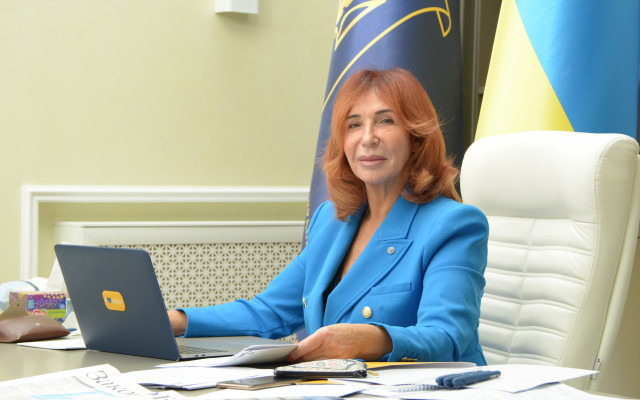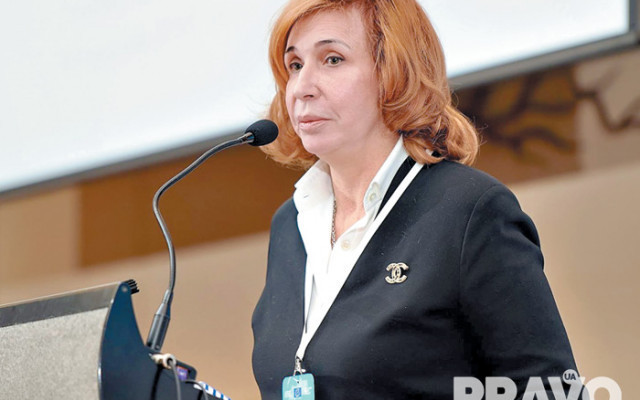
Home quote
The Declaration aims to protect human rights and, indirectly, the professional rights of advocates. There are a lot of breaches of those rights; every advocate has his own experience and is a carrier of a particular formed vision of how to overcome the practice of such breaches.
Publications
The Declaration is a roadmap for the implementation of modern standards of protection of human rights
Mrs Izovitova, it is almost one year that the Declaration on the Protection of Human Rights in the Criminal Cases has been elaborated with the participation of the Ukrainian National Bar Association. What prompted the advocates to elaborate this document?
L. Izovitova. For a long time through various events: conferences, round tables, seminars and meetings of the Bar Council of Ukraine and the regional councils, we worked on the materials and arguments on the whole complex of problems of implementation of professional rights of advocates in the criminal proceedings, already under the new Code of Criminal Procedure. Actually, the text of the draft Declaration as an entire document was made public in March this year when advocates began to actively discuss it, express their opinions and make proposals.
Why does the Ukrainian National Bar Association pay now such a great attention to the issue of human rights in the criminal proceedings?
L. Izovitova. The process of improving the Code of Criminal Procedure is underway. When it was adopted, many talked about the principle of adversarial proceedings. It is still limited, the interests and the rights of citizens are not protected to the full extent. Advocates have rights mediated with those of the accused and the suspect. Given the wide range of the declared rights of participants in the criminal proceedings, it would seem that the advocates would also, by virtue of Article 46 CCP, get them in full.
But it is only at first glance. A distorted understanding of this rule leads to the fact that the advocate’s rights are limited, while his duties are groundlessly expanded: a notification of suspicion is often handed to the advocate instead of the suspect. Advocates experience harassment and lack of adversarial proceedings, and psychological and physical pressure not only in the proceedings. We have cases of the tragic death of advocates, in particular, in Kharkiv, Ternopil, Kyiv regions... There is every reason to link those advocates’ murders with their professional activities and to argue that this did not exist before; advocates were not equated with their clients. The situation of protection of human rights and professional guarantees of advocates gets complicated, and in these circumstances we decided to propose to the society a document reflecting our vision of how to resolve it.
For further deployment of a large-scale work on real protection of human rights in criminal proceedings it is now crucial how we will actually fill the document which has already been discussed and developed by advocates of Ukraine.
Positive "charge" of the Declaration raises no doubts, but its design sometimes causes debates in the course of the discussions. What causes these debates?
L. Izovitova. The Declaration aims to protect human rights and, indirectly, the professional rights of advocates. There are a lot of breaches of these rights; every advocate has his own experience and is a carrier of a particular formed vision of how to overcome the practice of such breaches. Since the text of the Declaration is just being created, every advocate wants the formulation of theses in this document to be more perfect and to be consistent with his own vision of the situation. Without counterarguments, this process is difficult to imagine. Debate is the advocate’s profession, and here he receives in his hands a set of principles formulated by other advocates and collected in one newly structured text. That is the reason for debates – both as regards the compliance of certain provisions with the rules of law, and as regards the legal terminology.
On the one hand, there are heated debates, and on the other, we can see certain inertia of part of the advocates in the development of the text of the Declaration, which eventually evaluate it in a hurry. The majority of critics begin their statements saying: "I just happened to read this document…”. Why is this happening and how to overcome such an attitude?
L. Izovitova. An advocate lives the life of his clients. What happens with the client, determines the content of the advocate’s activity, fills him with the events. The advocates, absorbed by the client’s cases, do not always have an opportunity and time to go beyond specific precedents and to see a larger picture. Having a considerable number of cases at the same time, an advocate thinks on how to save life, health and dignity of his or her client. An advocate has a full-time working day, which passes in thinking over legal steps and in modeling situations. There is no sufficient time to think about the general issues of the legal profession. Since the participation in this discussion allows time for understanding a larger picture and for participation in it, the advocate is trying to use his or her full creative potential and emotional load, criticizing the document he or she has read. However, it is very difficult to induce him or her to formulate a thesis the way he or she imagines it in a perfect state and to transfer the critical remarks into the constructive work. Client’s cases remain the priority.
The bar self-government bodies, in accordance with their purpose, assumed, therefore, the solution of such problems as the development and improvement of the text of the Declaration, in cooperation with other stakeholders and partner organizations. The Working Group of the EU Project "Support to Justice Sector Reforms in Ukraine" visited regions and collected materials to enhance the document and to perfect the wording of some of its theses. This work has been successfully completed, while a critical approach of advocates only serves the cause.
So, one can understand that there is no stability yet in the application of the new CCP, and therefore advocates, having different practices, differently see the ways of overcoming the problems of human rights violations in criminal proceedings?
L. Izovitova. One thing is a high-quality and balanced law; another thing is how it is applied. The Code of Criminal Procedure has been in force for only two years so far and it is exactly the practice of its application that should point to what needs to be changed in it. Each prosecutor, each judge reads a legal provision and understands it quite individually, often applying the provision not in the interests of justice, not for achieving the goal of the criminal proceedings, but for achieving certain purposes of a procedural or another nature.
In this case, the guarantees of legal profession and human rights are violated. Everything set out in the Declaration, should therefore be understood as a set of changes in practices and in provisions, which in the advocates’ opinion are urgently needed today: what and how should prosecutors, defenders and judges do according to the current criminal procedural law and international law. It is exactly from this angle, "in the advocates’ opinion", that the key principles of human rights protection in criminal proceedings are formulated in the Declaration.
Does the modality of the phrase "in the advocates’ opinion" give the reason to understand that the Declaration was formed based only on advocates’ proposals?
L. Izovitova. The events, at which the proposals were elaborated, were attended by the representatives of the judiciary, prosecutor's office, police and public administration. They also added arguments and practical material to the overall picture of things. We say "in the advocates’ opinion", because the contribution of the mentioned participants of this community was not formulated in the specific documents of the organizations they represent. Instead, the advocates express their own position in the form of the Declaration.
Basically, each thesis of this paper can find its reflection in the national legislative act or in international law from which it derives. This is not the elaboration of new demands which are ignored by those who must strictly adhere to them. They are summarized in one text based on criterion of what is more important for the protection of human rights from the perspective of different advocates in different regions. Therefore, the Declaration does not have the characteristics of integrity and logic inherent to a legal document. With the joint efforts, the text will be polished, including at the stage of implementation of the Declaration at the relevant systemic events.
The joint participation of judges, prosecutors, representatives of the interior with advocates in the discussion of the thematic chapters of the Declaration was quite active, something that had not been often seen before. Is one of the objectives of the Declaration to contribute to overcoming of the institutional fragmentation of participants in criminal proceedings?
L. Izovitova. Obviously. Now we can hear some prosecutor beginning his/her speech with the words "in my opinion", although we understand that the prosecutor’s opinion actually is not important, because he/she acts on behalf of the State. The prosecutor’s opinion must be based on the law, the tasks of the proceedings and purposes of the prosecution. The opinion which is not "built-in" in the design of implementation of these goals and objectives belongs to the prosecutor as a private person, and in any case not to the representative of the State; it cannot be taken into account by the court or otherwise considered in criminal proceedings. Meanwhile, when an advocate expresses an opinion in the proceedings, we understand that it does not belong to him/her as a private person, but rather is derived from the objectives of legal assistance to the client, whom he/she defends or represents.
As part of the free exchange of ideas during the discussions on similar issues, a common language is found and the approaches are converged. And although this work is designed for a long time, there have indeed been more discussions around the Declaration and the polemics of different participants in the criminal proceedings are less reminiscent of the Tower of Babel, where everyone speaks different languages.
Does this mean that the text of the Declaration will further be developed, already at the stage of its implementation?
L. Izovitova. Certainly. We regard the Declaration as a living document that will be filled with new ideas and positive practice. The Declaration will be implemented on the basis of the action program which will also be part of the dissemination of the ideas embodied in this document.
In fact, everyone has different tasks, but the Code of Criminal Procedure is single and it has a single objective - it is clearly written in the relevant provision - Article 2 CCP, where it is stated, among others, that "... no innocent person should be charged or convicted".
The legal community faces the problems that must inevitably be overcome by joint efforts. Say, the Law of Ukraine "On guaranteeing the right to a fair trial" introduced the provision that a complaint against a judge can be lodged with the Higher Qualification Commission of Judges only by an advocate, and only by an advocate who did not participate in the proceedings, in respect of which the complaint is lodged. On the one hand, this provision is fair and it aims primarily at ensuring that complaints reach the HQCJ in a professionally written manner; on the other hand, can an advocate fully prepare a document, if he or she did not participate in the case and his or her professional rights were not breached by that particular judge; will the advocate agree to write a complaint against a judge, with whom he or she is very likely to meet in the future proceedings?
The novelty is fair for the proceedings, but for the outcome, it seems, it is questionable.
L. Izovitova. This provision will eventually contribute to the implementation of the principle of adversarial proceedings in the disciplinary process before the HQCJ. I have confidence that soon there will be advocates specializing in such complaints; there will also be those representing judges. Therefore, the communities of legal practitioners, which are institutionally disparate today, will move towards each other. The Declaration prepared by the advocates can be regarded as the decisive step of the bar in this direction.
Will the Declaration be filled with the new material in the course of its practical implementation by advocates and, let’s expect, by the other participants in criminal proceedings?
L. Izovitova. I think it may even get shorter. As we proceed in the improvement of the legislation and practice, some provisions of the Declaration will lose their relevance and move into the category of the usual practice, so its text – the totality of theses designed to help overcome human rights violations – will get decreased by overcoming these trends and establishing civilized relations in criminal proceedings.
Should one expect any such changes in the foreseeable future? We know that no matter how perfect the law is, the inquisitorial system with its inertia swallows the novelties or absorbs them, and due to its inner essence it inhibits any changes.
L. Izovitova. Of course, we do not have real adversarial proceedings yet; the reflexes of the outdated system with its non-procedural relations and external influences are still echoed; advocates still do not have a right to collect evidence; the presumption of guilt loses ground very slowly; the burden of liability puts pressure on judges because they bear the highest responsibility among all the participants in the proceedings.
This notwithstanding, there are some improvements in the situation and the new eventually always overcomes the obsolete. In this context, we see the Declaration as a roadmap for the implementation of changes and the establishment of such relations in the criminal proceedings that meet modern standards of human rights protection.
The Declaration is a characteristic of the state of affairs in the criminal proceedings, which we strive to achieve.
The conversation was held by Leonid Lazebnyy, chief editor of the journal "Advocate".

Lydia Izovitova
President of the Ukrainian National Bar Association and the Bar Council of Ukraine, President of the Union of Advocates of Ukraine, Honored Lawyer of Ukraine
Other publications author

Publication
Formula of perfection
Author: Lydia Izovitova

Publication
Interview with Lydia Izovitova on the occasion of the 8th anniversary of the founding of UNBA: We are the voice of the profession, which cannot b…
Author: Lydia Izovitova

Publication
The Declaration is a roadmap for the implementation of modern standards of protection of human rights
Author: Lydia Izovitova
Publications

Volodymyr Matsko Extradition as a systemic form of rights violations

Victoria Yakusha, Law and Business The anti-corruption vertical cannot «take care» of the Bar as an institution, - acting head of the HQDCB

Censor.net Protecting advocates – protecting justice: addressing concerns about the new law

Ihor Kolesnykov A BRIEF SUMMARY REGARDING THE APPLICATION OF THE ORDER ON EXTENDED CONFISCATION IN LATVIA REGARDING FINANCIAL ASSETS OF…

Valentyn Gvozdiy WORKING IN A WAR ZONE

Lydia Izovitova Formula of perfection

Sergiy Vylkov Our judicial system is so built that courts do not trust advocates

Iryna Vasylyk Advocacy in the proclamation of Independence of Ukraine
